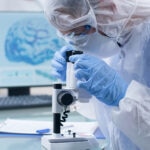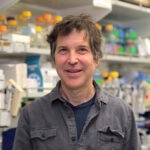The BBVA Foundation awarded the Frontiers of Knowledge Award in Biomedicine in this fifteenth edition to David Baker, Demis Hassabis and John Jumper “for their contributions to the use of artificial intelligence for the accurate prediction of the three-dimensional structure of proteins.” In the words of the committee, the winners achieved an advance with huge biomedical potential for the development of new treatments against multiple conditions.

The laureates developed deep learning systems that predict the three-dimensional structure of proteins with unprecedented accuracy and exceptional speed. In a matter of minutes the AI arrives at a result that in the past involved years of lab work.
David Baker (Seattle, Washington, USA, 1962), a Professor of Biochemistry at the University of Washington and a researcher at the Howard Hughes Medical Institute, is the creator of the RoseTTAFold program. Demis Hassabis (London, UK, 1976) and John Jumper (Little Rock, Arkansas, USA, 1985), respectively the CEO and senior researcher at the artificial intelligence company DeepMind, are the joint authors of AlphaFold2. These two technologies have made it possible to know the structure of almost all documented proteins from humans, animals, plants and even bacteria. This knowledge serves to speed up the development of new drugs and vaccines.
In addition, the technology helps design completely new proteins based on a simple description of the functions they are intended to perform. This opens the door to the development of treatments to combat everything from the influenza virus or Covid-19 to cancer cells or the malaria parasite.
A technological shortcut to predict the structure of proteins
The DNA of our cells contains all the instructions we need to develop, survive and reproduce. But proteins are the workhorses that keep all these functions going, and it is their three-dimensional structure that determines their exact mission.
To know the specific role a protein fulfills, it is not enough to know the DNA sequence encoding it, or even to identify the amino acid sequence into which the genetic information is translated. The key to understanding how a protein will act lies in the arrangement in space it adopts through folding, but deciphering this in the lab has so far proved a slow and rather scattergun process.
“Scientists always assumed that it was just too hard to understand how proteins fold. To try and deduce it from the underlying physical principles, you need a vast quantity of computing resources to even guess at their most stable form,” explained Dario Alessi, a committee member and head of the MRC Protein Phosphorylation and Ubiquitylation Unit at Dundee University (United Kingdom), shortly after the decision was reached. “But the awardees have come up with an AI-driven shortcut using a deep-learning technique,” Alessi added.
“I believe AlphaFold represents really the first powerful example of how deep learning is able to capture the complexity of biological systems and really develop mathematical understandings of extraordinarily complex things,” declared Jumper in an interview granted after hearing of the award.
“AlphaFold has already made a huge impact on biological research in quite a short space of time,” adds fellow laureate Demis Hassabis. “We know that over a million researchers have used the structures predicted by AlphaFold in their research, and pretty much every pharma company in the world has been using AlphaFold in their drug discovery programs.”

David Baker (Seattle, Washington, USA, 1962).
‘Designer’ proteins to block viruses and cancer cells
As well as predicting how naturally-occurring proteins will fold, the RoseTTAFold program led by David Baker has also proved able to design completely new proteins based on a simple description of their target functions. The program can thus obtain proteins to block not only flu virus or COVID-19 proteins, but also cancer cells, and its results have been successfully tested in the lab.
“New proteins can be improved medicines, so there are many new and exciting medical applications. For example, creating new vaccines or new cancer treating medications.” Baker explains.
Some decades back, this American biochemist and computational biologist began exploring ways to deduce the structure of proteins guided by the principles of physics, and wrote his findings into an algorithm known by the name Rosetta. The new method performed fairly well with small proteins but demanded large computational resources and expert knowledge to get it working properly.
In parallel, Demis Hassabis and John Jumper decided to use artificial intelligence to solve the problem in a quicker, more accessible way. This first iteration, which they called AlphaFold, was launched in 2018. “We had the best system in the world at the time,” says Jumper, “but it was still far, far off from what we knew was the kind of accuracy needed to be really experimentally relevant.”
They accordingly set to work to design a better system. When announcing AlphaFold2, Jumper had outlined some of its underlying concepts, and Baker was quick to take note. “We started having meetings every week in my group,” he recalls, “and we started to systematically go through different ideas and experimenting, and that ultimately led to RoseTTAFold.”
The product was launched a few months later. The level of accuracy was comparable to that of AlphaFold2, plus it came with an added functionality: from a protein with a given shape, it obtained the corresponding amino acid sequence.

John Jumper (Little Rock, Arkansas, USA, 1985).
Open source tools for the biomedical research community
Nowadays both RoseTTAFold and AlphaFold2 are freely available to the scientific community, and recent upgrades have practically equalized the computing times required by each.
Thanks to these tools, almost all documented proteins, not only human but those of animals, plants and even bacteria have yielded up their structural secrets. And this knowledge will find immediate application in the creation of new drugs and vaccines.
“We have already seen AlphaFold being applied to a huge range of problems,” says Hassabis. “Some of the things we’re most excited about it being used for are drug discovery, for example, to combat antibiotic resistance, or to try and find cures for diseases like malaria.”
Computational biologist Gonzalo Jiménez Osés, Principal Investigator at CIC bioGUNE in Bilbao and one of the nominators of the new laureates, explains one of the most promising facets of this contribution in the biomedicine area: “Among AlphaFold’s successes has been to integrate the vast amount of genetic and structural information contributed by scientists over the decades to open access databanks into an advanced neural network together with a sophisticated machine-learning algorithm, and one immediate byproduct will be in new drug design. In classic drug development, we will certainly discover novel therapeutic targets.”
“But, more important still,” Osés points out, “We will rapidly arrive at a more precise understanding of the network of protein interactions occurring in diseases such as cancer and immune system disorders, and this will lead to new treatments, because computer simulations of these complex processes will be far more reliable.”

Demis Hassabis (London, United Kingdom, 1976).
The revolution in purpose-designed proteins for more sophisticated medications
For the moment, the biggest impact for new vaccine and drug creation lies in the design of proteins ‘á la carte.’ The latest RoseTTAFold version even allows us to create proteins from simple descriptions.
An anti-coronavirus vaccine created with RoseTTAFold is now being used in South Korea. And new purpose-designed anti-cancer medicines are being tested in human clinical trials. There are even plans to develop a nasal spray that protects against COVID and other respiratory viruses.
“We believe that almost all of medicine will be transformed by the protein design revolution,” says Baker. “Most medicines today are made by making small modifications to the proteins which already exist in nature. Now that we can design completely new proteins, we can develop much more improved, more sophisticated medicines that, for example, can treat cancer without the side effects, be made very quickly upon the outbreak of a new pandemic, and in general will be more precise and more robust.